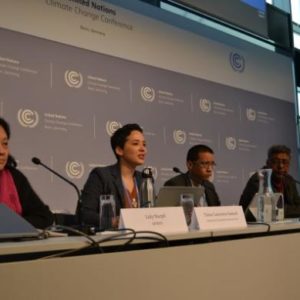Photo: Press conference on the first day of the recent U.N. climate treaty meetings in Bonn, Germany. Left to right: Lidy Nacpil from the Asian Peoples Movement on Debt and Development, International Policy Director Tamar Lawrence-Samuel, Brandon Wu from ActionAid, and Willy D’Costa from the Indian Social Action Forum.
Even just two years ago, it was almost unimaginable that the conflicts of interest posed by the presence of fossil fuel corporations would be a primary topic at any U.N. climate treaty meeting. But our steady campaigning has paid off in a big way: During the last two weeks, practically everyone involved in and covering the treaty meetings in Bonn, Germany, had something to say about the fossil fuel industry’s conflicts of interest.
A few days before the meeting, we released a report, Inside Job, which exposed how groups representing industry interests are allowed access to climate treaty negotiations despite a hefty track record of undermining climate action. Media outlets from the Financial Times, to NPR, to Mother Jones, to mainstream German outlets, to the French Le Monde covered the report. And when our team arrived in Germany, it was clear many government delegates had already read the exposé.
Big polluters and governments that represent their interests (namely the U.S., Australia, and the European Union) quickly shifted from doubting this issue would gain traction to spending the first day and a half of the meetings intensifying their attempts to keep the issue from being discussed.
You know you are doing something right when one of the most powerful industry front groups feels compelled to respond to your research. The Chamber of Commerce, which was featured in Inside Job and has received millions of dollars from Exxon Mobil, wrote an unconvincing blog post about why fossil fuel corporations need to be at the negotiating table.
But despite the attempts by the industry to put the kibosh on discussions of conflicts of interests, we successfully made it the centerpiece topic during a workshop about the participation of non-Parties (read: all entities that are not government delegates). During the workshop, governments and civil society representatives demanded the U.N. treaty body address the irreconcilable conflicts of interest between the fossil fuel industry and the policies that must be made to slow and address the effects of climate change. International Policy Director Tamar Lawrence-Samuel reminded everyone that weeding out vested interests through conflict of interest policies is not the exception, but the norm, in governments and similar forums around the globe.
For the first time, parties officially discussed conflicts of interest at UNFCCC meetings during #SB46. Learn more: https://t.co/OFQF92NJ6O pic.twitter.com/4Ha5iFn4On
— Road Thru Paris (@RoadThruParis) May 10, 2017
Predictably, business groups and the governments that represent their interests intervened in defense of corporate inclusion. At one point, a delegate from Australia even went so far as to call Exxon Mobil a corporation that was leading on climate action!
We followed the workshop with a packed press conference, and continued to keep this issue front and center throughout the rest of the meetings.
With this success under our belts, we will continue to organize governments and allies to support the adoption of a policy that kicks big polluters out of the U.N. climate treaty for good. We know it’s ambitious, and we also know it’s possible. Most importantly, we know it must be done to save people and our planet from climate catastrophe.



